He shrugged off the memories of Carolyn, unboxed the duplicate tape recorder he had bought before returning to the Harbour Club, and began listening once more to the tape of the Hilgers and the Barths answering his questions aboard the Docksie III. He found it uncommonly difficult to keep his attention in close and careful focus. It irritated and puzzled him. One of the abilities he had found most useful was the knack of shutting out everything except the task at hand, and never permitting any random thought or distraction to intrude.
And this kind of listening was part of his profession — to listen to the words people said and weigh the nuances, guess at the deletions, evaluate the inconsistencies. Verbal communication was astoundingly inexact. People seldom listen to one another. But the truth was always there in some form, sometimes only a shape seen through layers of mist.
He began tape and stopwatch again, brought himself into a total focus, and began to jot down a log of the portions needing a more careful evaluation. The segments to study were when Dr. Barth, the wiry sunbrowned dentist with the steel-rimmed glasses was answering questions, and where Lulu Hilger, the tall brunette wife of the owner of the cruiser, was speaking. They had been the only ones in the cabin when Staniker had explained what had happened.
When Jonathan Dye knocked at the door, Sam emerged from his work, was instantly aware of hunger and was surprised to see that it was two o’clock in the afternoon.
Jonathan strode about the room full of restless energy and explained that he could make a deal with what seemed to be the right boat and man, if Sam approved.
“His name is Moree. Stanley Moree and he’s from Nicholl’s Town at the north end of Andros, Sam. He knows the Great Bahama Bank like the back of his hand. He built a boat he could use on the Bank. It’s a sailing catamaran and he can set the rudders up so it draws less than a foot of water. He’s got a way to fix a little five-horse Seagull motor on it, and he built in a fresh-water tank too. He’s even got a little one-lung gas generator he can start up that’ll run a little marine radio. When we find her we might have to get help in a hurry. He says that if I buy the provisions, he’ll charge me four pounds a day. Or twenty pounds a week. That’s only fifty-six dollars. It’s seaworthy. He’s brought it over here and taken it back a dozen times. It’s here now. And he can leave any time. It’s only twenty miles, a little more, from the tip of New Providence to Nicholl’s Town and from there we’re only twelve or fourteen miles from the Joulter Cays. Some friends I’ve made here say he’s a good man. Is it okay with you, Sam?”
“It’s fine with me. I brought some cash along out of the office safe.” He went to the closet and took his billfold out of the inside pocket of his jacket, and with his back to the room took four hundred dollars from the amount in the back compartment, hesitated, added another two hundred. He handed the money to Jonathan saying, “I didn’t know what I might need it for. Renting a plane or a boat. Something like that.”
Jonathan counted it. “This is — quite a lot. Thanks, Sam. I can get some other things I was thinking about. Some more first-aid stuff. And a good pair of binoculars. Some flares. And I want to see if I can find one of those bull-horn things that run off six-volt batteries.”
“Take some salt tablets for yourself. And sun lotion. Get a good sleeping bag.”
“Stanley Moree is going to phone me here in a few minutes. To find out if it’s okay. Then I’m to meet him at the boat in an hour.”
“There’s some interesting things on this tape. Want to hear them?”
“If you don’t mind — I mean, I can’t get very interested in what Staniker said or didn’t say. It’s sort of — after the fact. Sam, could you tell him I’ll meet him down at the boat, and everything is all set?”
After Jonathan was gone, Sam Boylston went out onto the small balcony into the sun heat from the air conditioning. He leaned his palms on the cement of the balcony wall. The great clowns, he thought, were great because they could give you a pungent taste of that curious emotion, that fringe emotion where tragedy and comedy overlapped, could make your eyes sting while you guffawed. Jonathan, in his tall bony, sallowed, half-clumsy toughness, in all his earnestness and his self-delusion, would glide through the crystalline Kodachrome shallows in the homemade catamaran, lift the bull horn to sun-cracked lips and send that forlorn electronic bray across the nubbins of sand and rock and weed, startling the crabs and the sea birds. LEILA LEILA LEILA.
He looked over at a group of young people at tables on the far apron of the pool. They were locals, children of people with memberships. These were sailboat people, race-week people, sports-car people, raised in the big and gracious old homes which faced the sea. Colonial British, raised among such a flood tide of tourism they accepted it as that sort of inconvenience one puts up with without rancor or particular attention — as Arab children accept the flies in the marketplace. He heard a girl laugh, and her voice had the extraordinary clarity and timbre peculiar to the English woman, and he singled her out as she walked toward the pool, a limber young thing, red-gold tan, sunbaked hair, brief dusty-pink swim suit, looking back to laugh again at her group. A boy got up to follow her and swim with her, a young man muscled and poised, totally assured of himself and of his place within his world. He was older than the others, the same age as Jonathan perhaps. Sam realized that in some past existence he had wanted, for Leila, some Texan counterpart of such a young man. Now, with a sudden feeling of revulsion, he saw how such a one would take the news of the sinking of the Muñeca. Pain and grief, of course. But a manly acceptance, tinged with a certain subconscious unadmitted pleasure in the martyr role, the public image to sustain of having loved and lost. “Damned shame, sir. Bad show.”
Far better the grotesquerie of disbelief, the absurd search, Don Quixote with bull horn and Japanese binoculars, peering and braying across the ten-thousand-year silence of the shallow Bank, giving not a damn for image, for impression, for status of any kind.
And I care too much, he thought. So much that I blush for a kind of madness I should cherish. So much I have pressured them all — Leila, Lydia Jean, Boy-Sam — trying to turn them into Carolyn Coopers and fellows full of sleek and watchful assurance...
The room phone rang and he went in, closing the glass door, to tell Stanley Moree he had a firm contract and Jonathan would join him at the boat. He then ordered food to be brought up to the room. After he had eaten, he listened again to Lulu Hilger’s voice in a sequence which interested him.
“I was watching over him. Bill and Bert were topside. Francie had been with me, but it made her too nervous watching him. And there was an unpleasant smell where the burns on his arm were infected, even after Bill Barth had dressed them, and Francie is always just a little queasy when she stays below in any kind of a sea. It never bothers me.
“He was sleeping, but he would thrash around sometimes and groan and mumble. Bill took his temperature before, and it was over a hundred and two. And his pulse was very fast. I wondered if he was getting more fever. I was sitting on the foot of the bunk. I leaned way over and hitched closer and put the back of my hand against his forehead. He gave kind of a convulsive jump and grabbed my arm just above the elbow. He sat right up, staring at me and breathing hard. I can’t remember exactly what he said. He had terrible strength in his hand. I think I almost fainted from the pain. See? I’ll have these bruises for weeks. He called me Christy. He seemed to be pleading with me to understand something. And like he was almost in tears about it. He was saying something like, ‘It wasn’t that way! You’ve got to understand that, Christy. You’ve got to help me. You’ve got to.’ He seemed terribly agitated. Then he slumped back suddenly, letting go of me. He was breathing very deeply and very fast. His eyes were closed. His face was covered with beads of sweat.
Читать дальше
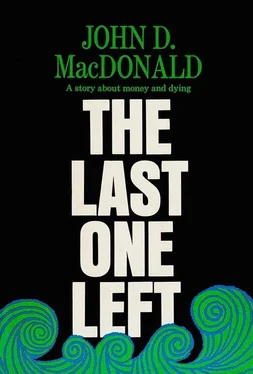

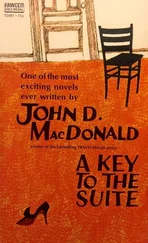
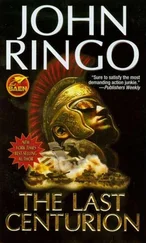


![Джон Макдональд - Wine of the Dreamers [= Planet of the Dreamers]](/books/430039/dzhon-makdonald-wine-of-the-dreamers-planet-of-thumb.webp)


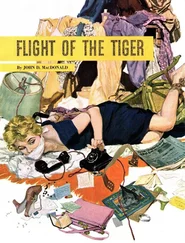
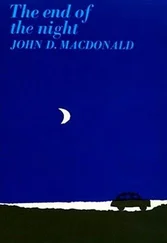
![Джон Макдональд - The Hunted [Short Story]](/books/433679/dzhon-makdonald-the-hunted-short-story-thumb.webp)
